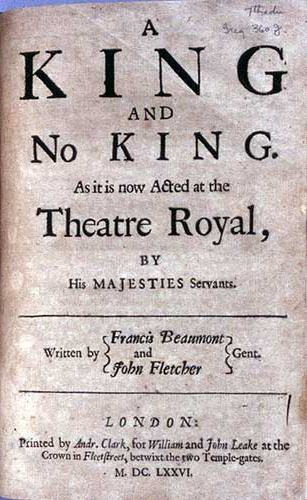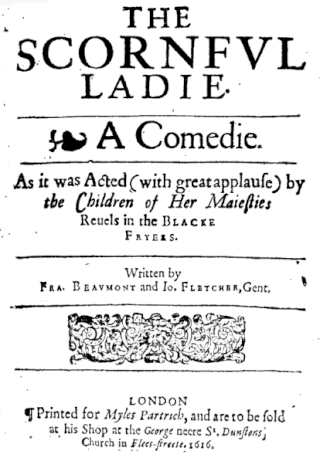Related Research Articles
Rollo Duke of Normandy, also known as The Bloody Brother, is a play written in collaboration by John Fletcher, Philip Massinger, Ben Jonson and George Chapman. The title character is the historical Viking duke of Normandy, Rollo. Scholars have disputed almost everything about the play; but it was probably written sometime in the 1612–24 era and later revised, perhaps in 1630 or after. In addition to the four writers cited above, the names of Nathan Field and Robert Daborne have been connected with the play by individual scholars.

Francis Beaumont was a dramatist in the English Renaissance theatre, most famous for his collaborations with John Fletcher.

Beaumont and Fletcher were the English dramatists Francis Beaumont and John Fletcher, who collaborated in their writing during the reign of James I (1603–25).

John Fletcher (1579–1625) was a Jacobean playwright. Following William Shakespeare as house playwright for the King's Men, he was among the most prolific and influential dramatists of his day; during his lifetime and in the early Restoration, his fame rivalled Shakespeare's. He collaborated on writing plays with Francis Beaumont, and also with Shakespeare on three plays.
The New Inn, or The Light Heart is a Caroline era stage play, a comedy by English playwright and poet Ben Jonson.
The Night Walker, or The Little Thief is an early seventeenth-century stage play, a comedy written by John Fletcher and later revised by his younger contemporary James Shirley. It was first published in 1640.
Cupid's Revenge is a Jacobean tragedy written by Francis Beaumont and John Fletcher. It was a popular success that influenced subsequent works by other authors.
The Beaumont and Fletcher folios are two large folio collections of the stage plays of John Fletcher and his collaborators. The first was issued in 1647, and the second in 1679. The two collections were important in preserving many works of English Renaissance drama.
The Fair Maid of the Inn is an early 17th-century stage play. A comedy in the canon of John Fletcher and his collaborators, it was originally published in the first Beaumont and Fletcher folio of 1647. Uncertainties of the play's date, authorship, and sources make it one of the most widely disputed works in English Renaissance drama.
Four Plays, or Moral Representations, in One is a Jacobean era stage play, one of the dramatic works in the canon of John Fletcher and his collaborators. Initially published in the first Beaumont and Fletcher folio of 1647, the play is notable both for its unusual form and for the question of its authorship.

The False One is a late Jacobean stage play by John Fletcher and Philip Massinger, though formerly placed in the Beaumont and Fletcher canon. It was first published in the first Beaumont and Fletcher folio of 1647.
The Double Marriage is a Jacobean era stage play, a tragedy written by John Fletcher and Philip Massinger, and initially printed in the first Beaumont and Fletcher folio of 1647.
The Coxcomb is an early Jacobean era stage play, a comedy written by Francis Beaumont and John Fletcher. It was initially published in the first Beaumont and Fletcher folio of 1647.
Love's Cure, or The Martial Maid is an early seventeenth-century stage play, a comedy in the canon of John Fletcher and his collaborators. First published in the Beaumont and Fletcher folio of 1647, it is the subject of broad dispute and uncertainty among scholars. In the words of Gerald Eades Bentley, "nearly everything about the play is in a state of confusion...."

A King and No King is a Jacobean era stage play, a tragicomedy written by Francis Beaumont and John Fletcher and first published in 1619. It has traditionally been among the most highly praised and popular works in the canon of Fletcher and his collaborators.
The Captain is the title of a Jacobean era stage play, a comedy written by Francis Beaumont and John Fletcher. It was originally published in the first Beaumont and Fletcher folio of 1647.

The Scornful Lady is a Jacobean era stage play, a comedy written by Francis Beaumont and John Fletcher, and first published in 1616, the year of Beaumont's death. It was one of the pair's most popular, often revived, and frequently reprinted works.
The Noble Gentleman is a Jacobean era stage play, a comedy in the canon of John Fletcher and his collaborators that was first published in the first Beaumont and Fletcher folio of 1647. It is one of the plays in Fletcher's canon that presents significant uncertainties about its date and authorship.

Monsieur Thomas is a Jacobean era stage play, a comedy written by John Fletcher that was first published in 1639.
The Chances is a Jacobean era stage play, a comedy written by John Fletcher. It was one of Fletcher's great popular successes, "frequently performed and reprinted in the eighteenth and nineteenth centuries."
References
- ↑ E. H. C. Oliphant, The Plays of Beaumont and Fletcher: An Attempt to Determine Their Respective Shares and the Shares of Others, New Haven, Yale University Press, 1927; pp. 432–3.
- ↑ Fredson Bowers, general editor, The Dramatic Works in the Beaumont and Fletcher Canon, Vol. 2. Cambridge, Cambridge University Press, 1970; pp. 569–73, 692-5.
- ↑ Terence P. Logan and Denzell S. Smith, eds., The Later Jacobean and Caroline Dramatists: A Survey and Bibliography of Recent Studies in English Renaissance Drama, Lincoln, NE, University of Nebraska Press, 1978; p. 67.
- ↑ Baldwin Maxwell, Studies in Beaumont, Fletcher, and Massinger, Chapel Hill, NC, University of North Carolina Press, 1939; pp. 107–8.